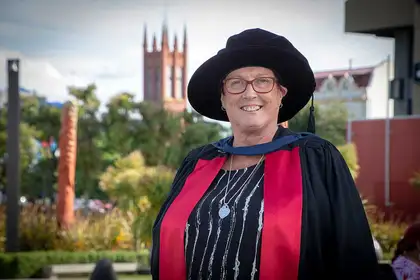
Eight staff members were conferred with doctoral degrees among the more than 450 graduates across the three ceremonies in Manawatū last week.
As the head teacher at Massey’s Child Care Centre at the Manawatū campus, Dr Raewyne Bary has plenty of experience in the needs of the very young. Her doctoral thesis explores the barriers to forming close attachments between toddlers and teachers.
Dr Bary, who graduated with a Doctor of Education, examined teacher education and understandings of attachment theory, as well as how rigid adherence to rosters and staff rotations can become a barrier to teachers forging the kind of bond necessary for a youngster’s optimal development, for her thesis.
Without that close bond with a teacher, often youngsters can become “lost children” – a phenomenon she has observed in some centres that prioritise organisational structure and routines above the emotional needs of the very young.
She says research has demonstrated that “close and affectionate relationships between infants/toddlers and teachers within early childhood settings are of vital significance. It is within these relationships that infants’ and toddlers’ cognitive, emotional and physical health is promoted and protected”.
These relational experiences, she says in the study, form “the blueprint for the manner in which children and adults approach and negotiate current and future relationships”.
Her findings suggest that centres should consider reducing teacher rotation in the infant and toddler areas to promote consistency and continuity for the infants and toddlers and their families/whānau. The concept of “pivoting” – being more flexible and responsive to a child’s needs, rather than strictly following a roster – is essential for key teachers in successfully forming an attachment with a toddler, she says.
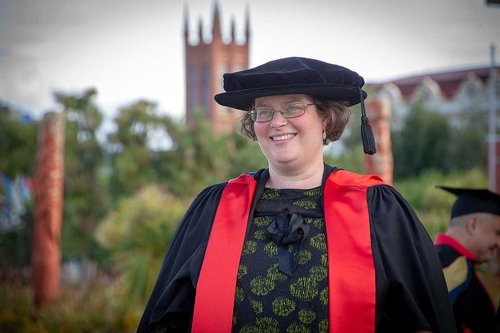
For her doctoral research in social anthropology, Dr Philippa Butler, a research officer in the Institute of Education, investigated the issue of identity in New Zealand among the number of those who identify with more than one ethnic group.
The number in this group is increasing but she says: “there is little understanding of what this means for individuals.”
Her mixed methods research examined the multiple ethnic identities of senior students (aged between 16 and 18 years), by focusing on how they identified themselves, what decisions formed the bases of their identifications, and what influenced their identifications at three interconnecting levels – state, institutional, and family and individual.
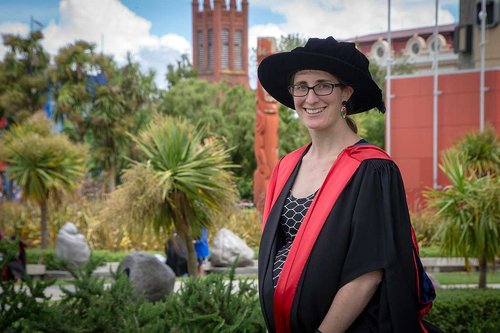
Dr Hayley Hunt’s doctoral thesis investigated “go slow” myopathy, a muscle disease that interferes with energy production in muscle cells. It is seen mainly in dogs used for pig hunting and working farm dogs, but pet dogs can also be affected. Dogs affected by the disease usually have a sudden onset of trembling and collapse, followed by long periods of lethargy, with some never returning to full fitness.
“Pig hunters and dog owners had been seeing cases of this disease for 10-15 years prior to my research, but veterinarians were largely not aware of it and little had been done to investigate it. This meant I was starting on the back foot and initially many of the dog owners knew more about the disease than I did and were reluctant to seek veterinary attention for affected dogs. However, as the study progressed, I have been fortunate to receive significant support from them.”
Her findings suggest the muscle damage is due to a plant or fungal toxin eaten by the wild pigs, which the dogs are exposed to when they eat the pig meat.
“The disease is important from an animal welfare perspective, as affected dogs may not return to full fitness and also from a food safety perspective. The wild pigs eaten by dogs prior to developing the disease are also eaten by people and cooked meat can still make dogs sick. There’s no convincing evidence currently that people are affected by the disease, but this is an area of ongoing research.”
Dr Hunt, a locum lecturer in veterinary pathology for the School of Veterinary Science, has received funding to do metabolomic/toxicological studies on pig meat eaten by dogs that developed go slow myopathy in order to try and definitively identify the underlying cause of the disease.
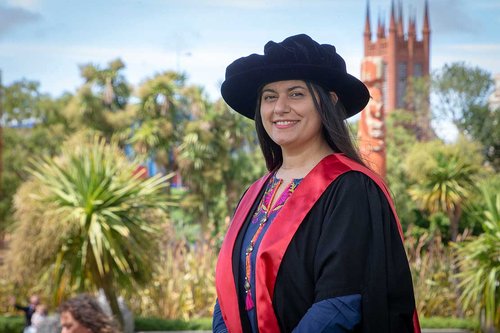
Very few New Zealanders understand what it’s like to live under the constant threat of terrorism. But Massey Business School lecturer Dr Fatima Junaid knows only too well – through both personal experience and her PhD research.
Dr Junaid, who recieved her doctoral degree from Massey University this morning, researched the impact of terrorism on employee outcomes. Using data largely from Pakistan, her home country, she found the trauma level of respondents was on par with that of war veterans.
“But people don’t always realise the effect it is having,” she says. “When I asked them about their job stress, they rated it higher than the stress caused by terrorism.”
She believes this is because people in Pakistan have become “habituated” to the daily threat of terror attacks. She found that many people were able to function at work, but the underlying stress can lead to “resource depletion”.
“So, they are working and their productivity and job satisfaction levels are similar to what you might find in other countries, which is surprising, considering the circumstances,” she says.“But the combination of terrorism, or post-traumatic stress disorder, with job stresses has a more dire effect than each of these things separately.”
Producing her PhD thesis was both a challenging and cathartic experience for Dr Junaid. As a university lecturer at the Institute of Management Sciences in Peshawar, one of the most volatile regions in Pakistan, she saw first-hand the impact of terrorism on the daily lives of her family, friends and students, including a devastating bomb blast in a student hostel.
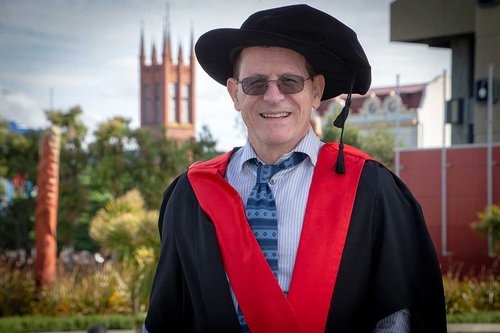
The development of learning support resources and tools to help students improve their writing skills – through workshops and reflective writing – is the theme of Dr Martin McMorrow’s thesis: Developing writing pedagogy and tertiary learning advice in a disciplinary programme at a New Zealand university.
He graduated with a PhD in English. The research question, which was the focus of his study, asked how a tertiary learning advisor working as an informal writing consultant to staff and students of a disciplinary programme within a New Zealand university could contribute to positive changes in writing pedagogy and tertiary learning advice.
“Progress was based on incremental ‘small wins’ through prolonged engagement with staff and students. This resulted in the provision of resources and workshops to support students in writing effectively within their disciplinary and professional context,” his thesis found.
Dr McMorrow is a learning consultant at the Centre for Teaching and Learning, based at the Auckland campus. He has a background in language teaching and teacher training, having worked in South America, Europe and Australia before coming to New Zealand in 2005.
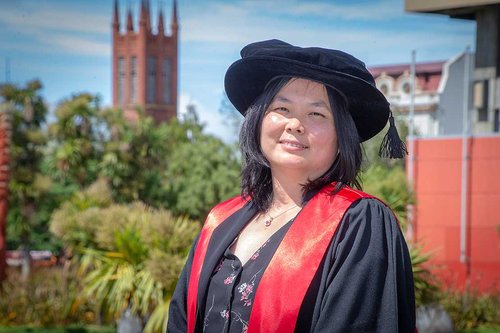
Dr Kuen Yuen, a senior tutor for the School of Economics and Finance, examined the risk-adjusted performance of hedge funds for her doctoral thesis. Her study extended prior research and examined three aspects of performance: the active return or alpha, performance persistence in return and survival determinants.
Findings from her research will enable institutional and retail investors to overcome selection problems when deciding which funds to invest in to enhance future portfolio performance and provide an explanation for its growth.
One of the key findings is that hedge funds that are larger and perform better with lower redemption frequency have a higher likelihood of survival. Surprisingly, hedge fund incentive structures such as management fees, incentive fees and lockup provisions have little impact.
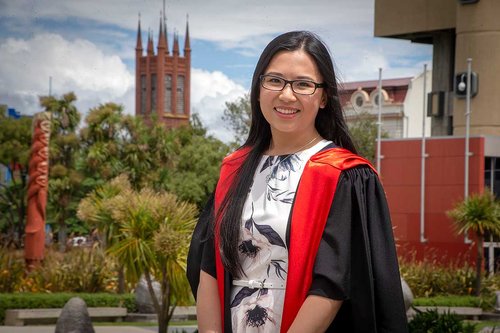
Dr Anynda Yuris, a food technologist at the Massey Institute of Food Science and Technology, explored the interaction of wheat starch and the polysaccharide – a type of carbohydrate – of the herb known as Mesona chinensis for her doctoral thesis. The two ingredients are commonly used to make a black gel like dessert that is consumed in many Asian countries.
Dr Yuris’s research sought to discover if the combination of the polysaccharide extract with wheat starch could create a low glycaemic index (GI) food. “This has implications for the creation of starch-based food products for people suffering from diabetes, as starch is a high GI food that raises the blood sugar level in the body of diabetics when consumed,” she says.
“My research focused largely on understanding the interaction between the two components. This is important because we need to understand the fundamental mechanisms by which things work in order to make them work and, also, identify other ingredients that may possess the same properties for future use.”
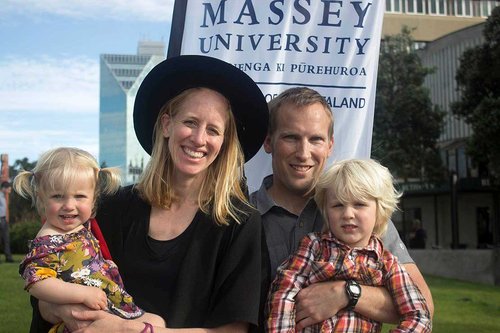
Dr Carrie Vander Zwaag’s doctoral research focussed on the role of differentiation – the modification of teaching and learning through adaptations to content, process, or product – and how it can increase educators' abilities to meet students' diverse learning needs. Her interest was in the little-researched area of how teachers differentiate effectively in mainstream science classrooms.
Her mixed methods action research study enabled a rural, bicultural Aotearoa school community's year nine and ten students, science teachers and whānau to share their perspectives on current classroom practice and from these perspectives, develop, implement and evaluate a differentiated science unit.
Her findings indicated that student engagement and learning in science improved, for Māori and non-Māori students from across the learning spectrum, when teachers differentiated responsively. Dr Vander Zwaag, a research assistant in the Office of the Provost, says her research supports the need to “increase the quality of culturally responsive science teaching and learning that meets diverse learners' needs both within Aotearoa New Zealand and internationally”.